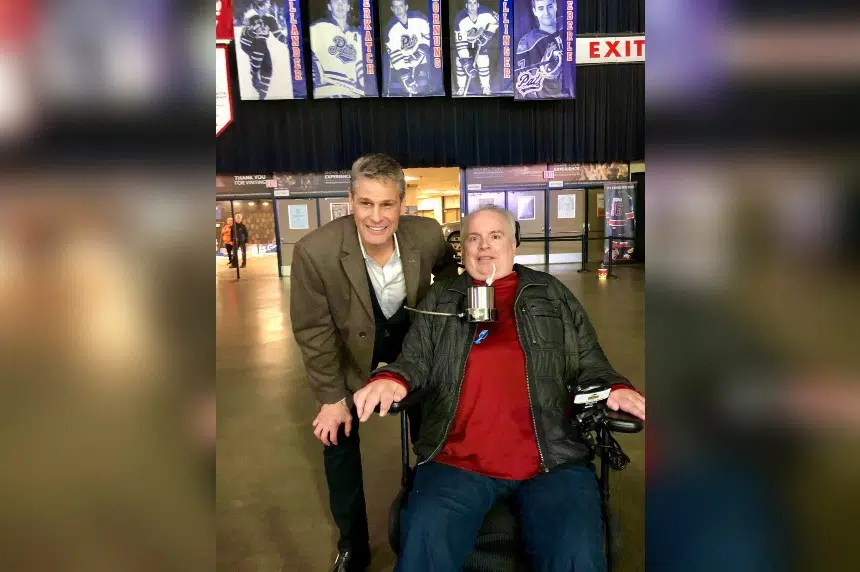Brad Hornung, a former Regina Pats forward who was left paralyzed after an on-ice collision during a WHL game in 1987, died Tuesday evening at the age of 52.
According to a media release from the WHL’s Pats, Hornung died after a brief battle with cancer.
“This is a sad day for the hockey world, the WHL, the Regina Pats and the Hornung family,” John Paddock, the Pats’ vice-president of hockey operations, head coach and general manager, said in the release. “Brad set an example that was passed on to him by his dad and family that we as Regina Pats look to emulate.
“As a promising young player, Brad was dealt a difficult hand that stopped his playing career but did not stop his life and all that he accomplished, which included earning a degree, becoming an NHL scout, remaining a faithful fan and having his number 8 retired. More importantly, he was encouraging and an inspiration to all who crossed paths with him.
“Brad lived his life to the fullest and was such a loyal man. Forever a Regina Pat; Rest in peace, Brad.”
Former Pats general manager Brent Parker took to Twitter to offer his thoughts on Hornung.
Brad Hornung was a wonderful person and someone who helped me understand what it meant to be a Pat when I first arrived in Regina. He is an Icon and an inspiration to all who knew him and the hockey community and our city are poorer without him. Rest easy Brad! pic.twitter.com/6Ygh5fRxNT
— Brent Parker (@BrentRParker) February 9, 2022
Hornung, a product of Regina, played two seasons (1985-87) with the Pats. Doug Sauter arrived to coach the Pats in 1986 and recalls the type of player Hornung was.
“He was one of the future stars. He was just 18 years old and had his whole career ahead of him. I was very excited to be his coach,” Sauter said Wednesday.
“I thought that the roles I used him in, he exceeded (expectations) and he was going to mature into a very fine pro hockey player. Everything changed on March 1, 1987 when the accident happened.”
On that night, Hornung suffered a spinal cord injury and was left a quadriplegic after he was checked from behind into the boards during a game against the Moose Jaw Warriors.
Sauter called the accident “a coach’s nightmare.”
“You make the choices of who plays and who doesn’t play and who’s on the power play,” Sauter recalled. “That night, we were on a power play. It was a big game with Moose Jaw. You could cut the intensity with a knife in the air inside the Agridome and this accident happens.
“We all know that accidents happen in all walks of life but this was about as worse a nightmare as a coach could have.”
Despite the life-changing injury, Sauter said Hornung remained positive in the years after.
“His attitude was always outstanding,” the coach said. “His character was top notch and his enthusiasm for life and improving himself was great … Unfortunately (Hornung) passing away last night will I think leave a large hole in the community as far as a role model goes.”
In the years after his injury, Hornung worked as a scout, including stints with the NHL’s Chicago Blackhawks and NHL Central Scouting.
“He had that willingness to learn and he was a great thinker. He researched things. He was very fortunate to grow up through the computer age and be able to work with his computer on recruiting and watching hockey players …,” Sauter said.
“His zest for life, I’ve never heard him once complain about being a quadriplegic. He made do the best he could.”
In April of 1988, the WHL introduced the Brad Hornung Trophy, which it awards annually to the WHL’s most sportsmanlike player. His No. 8 jersey was retired by the Pats.
“Brad was not only a great friend to all of us at the WHL, but his positive outlook on life was an inspiration to everyone who knew him,” WHL commissioner Ron Robison said in the release.
“Brad will always have a special place in our hearts, and our thoughts and prayers are with his family and friends during this difficult time.”
After his injury, Hornung eventually went back to school and received a Bachelor of Arts degree in history from Campion College at the University of Regina in 1996. He was recognized by the U of R for his courage and perseverance with an honorary Doctor of Laws degree on June 8, 2018.
“He was a role model, someone whose attitude was No. 1,” Sauter said. “He was a true friend. He was a true person who cared.
“He had great compassion to his fellow man. He treated people extremely well and he made the best of a terrible situation. I was proud to call him my player.”











